-
RESEARCH01-01-2016
Accessibility assessment of assistive technology for the hearing impaired
Revista Brasileira de Enfermagem. 2016;69(5):833-839
Abstract
RESEARCHAccessibility assessment of assistive technology for the hearing impaired
Revista Brasileira de Enfermagem. 2016;69(5):833-839
DOI 10.1590/0034-7167.2016690503
Views0ABSTRACT
Objective:
to assess the automatic accessibility of assistive technology in online courses for the hearing impaired.
Method:
evaluation study guided by the Assessment and Maintenance step proposed in the Model of Development of Digital Educational Material. The software Assessor and Simulator for the Accessibility of Sites (ASES) was used to analyze the online course “Education on Sexual and Reproductive Health: the use of condoms” according to the accessibility standards of national and international websites.
Results:
an error report generated by the program identified, in each didactic module, one error and two warnings related to two international principles and six warnings involved with six national recommendations. The warnings relevant to hearing-impaired people were corrected, and the course was considered accessible by automatic assessment.
Conclusion:
we concluded that the pages of the course were considered, by the software used, appropriate to the standards of web accessibility.
Keywords:Digital ExclusionDistance EducationInternetPeople with Hearing DisabilitiesSelf-help EquipmentSee more -
RESEARCH01-01-2016
Functional disability: health conditions and physical activity practice in older adults
Revista Brasileira de Enfermagem. 2016;69(5):825-832
Abstract
RESEARCHFunctional disability: health conditions and physical activity practice in older adults
Revista Brasileira de Enfermagem. 2016;69(5):825-832
DOI 10.1590/0034-7167.2016690502
Views0See moreABSTRACT
Objective:
to verify the prevalence of functional disability among older adults and how it can affect their health conditions and the regular practice of physical activities.
Method:
this is a household and cross-sectional study conducted with older adults of both sexes. We verified the variables associated with functional disability by Poisson’s regression.
Results:
around 420 older adults participated in this study (68.1% of them being women). We observed a statistically significant association between functional disability, the number of chronic diseases, self-assessed health conditions, and the practice of physical activities; the latter only being found among men. Older adults who reported presenting four or more chronic diseases, self-assessed their health conditions as poor, and were not used to practice physical activities, showing high prevalence of functional disability.
Conclusion:
considering the changeable character of these variables, we recommend that prevention actions be taken, mainly at primary level, to delay the emergence of disability.
-
RESEARCH01-01-2016
Organizational culture of a psychiatric hospital and resilience of nursing workers
Revista Brasileira de Enfermagem. 2016;69(5):817-824
Abstract
RESEARCHOrganizational culture of a psychiatric hospital and resilience of nursing workers
Revista Brasileira de Enfermagem. 2016;69(5):817-824
DOI 10.1590/0034-7167.2016690501
Views0ABSTRACT
Objective:
to analyze the organizational culture of a psychiatric hospital and identify the capacity of resilience of nursing workers.
Method:
quantitative research. For data collection, were used the Brazilian Instrument for Evaluation of Organizational Culture (IBACO – Instrumento Brasileiro para Avaliação da Cultura Organizacional) and the Resilience Scale (RS).
Results:
participants reported the existence of centralization of power and devaluation of workers, despite recognizing the existence of collaboration at work and practices for improving interpersonal relations. In relation to the capacity of resilience, 50% of workers showed high level, and 42.9% a medium level of resilience. The correlation tests revealed negative values between the IBACO and RS domains, indicating that the lower the appreciation of individuals in the institution, the greater their capacity of resilience.
Conclusion:
the organizational values reflect the work organization model in the institution that devalues the workers’ needs and requires greater capacity of resilience.
Keywords:Hospital AdministrationNursingOrganizational CulturePsychological ResilienceWorkers' HealthSee more -
EDITORIAL01-01-2016
Fazendo nossa pesquisa em enfermagem ser relevante
Revista Brasileira de Enfermagem. 2016;69(5):813-814
Abstract
EDITORIALFazendo nossa pesquisa em enfermagem ser relevante
Revista Brasileira de Enfermagem. 2016;69(5):813-814
DOI 10.1590/0034-7167-2015-0156
Views0Enfermeiros em todo o mundo estão cada vez mais expostos a metodologias de pesquisa novas e interessantes. Ao mesmo tempo, sentem uma pressão considerável para assegurar que os estudos a que se propõem são suficientemente rigorosos metodologicamente para passar pelo crivo de avaliação para fomento ou publicação. Nesse contexto, é cada vez mais importante lembrarmos […]See more -
EDITORIAL01-01-2016
Making our nursing research matter
Revista Brasileira de Enfermagem. 2016;69(5):813-814
Abstract
EDITORIALMaking our nursing research matter
Revista Brasileira de Enfermagem. 2016;69(5):813-814
DOI 10.1590/0034-7167-2015-0156
Views0Nurses worldwide are being increasingly exposed to new and interesting research methodologies. At the same time, they are feeling considerable pressure to ensure that the studies they propose are sufficiently methodologically rigorous to pass the scrutiny of review for funding or publication. In this context, it is increasingly important to remind ourselves that methodological rigor […]See more -
REVIEW01-01-2016
The Spiritism as therapy in the health care in the epilepsy
Revista Brasileira de Enfermagem. 2016;69(4):804-810
Abstract
REVIEWThe Spiritism as therapy in the health care in the epilepsy
Revista Brasileira de Enfermagem. 2016;69(4):804-810
DOI 10.1590/0034-7167.2016690425i
Views0See moreABSTRACT
Objective:
to present a brief history of Spiritism, the vision of epilepsy by Spiritism, and the potential of spirituality and religiosity care as complementary and coadjutants treatments in epilepsy.
Method:
this is a brief review about the impact of faith, spirituality, and religiosity, particularly the Spiritism philosophy as complementary treatment to neurological disorders (particularly focusing on epilepsy) and mental health. We conduct a review of published articles (about religion/spirituality and epilepsy) in the Pubmed and SciELO databases.
Conclusion:
the exercise of spirituality and religiosity can be a positive coping strategy to support the traditional therapy of patients with epilepsy and other neurological disorders. However, it is necessary to demystify myths and beliefs about the epilepsy and improve knowledge about this important health dimension among professionals, patients, and caregivers to explore their full treatment and supportive potential.
-
REVIEW01-01-2016
O Espiritismo como terapia no cuidado em saúde na epilepsia
Revista Brasileira de Enfermagem. 2016;69(4):804-810
Abstract
REVIEWO Espiritismo como terapia no cuidado em saúde na epilepsia
Revista Brasileira de Enfermagem. 2016;69(4):804-810
DOI 10.1590/0034-7167.2016690425i
Views0See moreRESUMEN
Objetivo:
presentar una breve historia del Espiritismo, la visión de la epilepsia por el Espiritismo, y el potencial de la espiritualidade y religiosidad como tratamientos complementarios y coadyuvantes de la epilepsia.
Método:
esta es una breve revisión del impacto de la fe, la espiritualidad y religiosidad, en particular la filosofía espiritual como tratamiento complementario de los trastornos neurológicos (centrada especialmente en la epilepsia) y la salud mental. Para esto, se realizó una revisión de la religiosidad/espiritualidad y la epilepsia en la base de datos PubMed y SciELO.
Conclusión:
el ejercicio de la espiritualidad y la religiosidad puede ser una estrategia de afrontamiento y tratamiento positivo para apoyar la terapia tradicional de los pacientes con epilepsia y otros trastornos neurológicos. Sin embargo, es necesario desmitificar muchas creencias sobre la epilepsia así como mejorar el conocimiento sobre este importante aspecto de la dimensión de salud entre profesionales, cuidadores y pacientes para explorar su potencial para el tratamiento y el apoyo.
-
REVIEW01-01-2016
Public actions for control of breast cancer in Brazil: integrative review
Revista Brasileira de Enfermagem. 2016;69(4):793-803
Abstract
REVIEWPublic actions for control of breast cancer in Brazil: integrative review
Revista Brasileira de Enfermagem. 2016;69(4):793-803
DOI 10.1590/0034-7167.2016690424i
Views0See moreABSTRACT
Objective:
to analyze the scientific production on “breast cancer” in the period from 2002 to 2013 and determine the public policies for screening and early diagnosis of breast cancer.
Method:
this is an integrative literature review conducted in the databases MEDLINE, LILACS, SciELO and Google Scholar. Inclusion criteria: year and period of publication; availability of the full article; publication in Brazil; and the cross-check of the keywords Breast Cancer, Primary Health Care, Screening Programs, and Early Detection of Cancer.
Results:
after analysis, four thematic categories were obtained: breast self-examination, clinical examination of breast, mammography, and factors that hinder the adherence to the screening.
Conclusion:
health professionals have deficits of knowledge on the area, indicating the need for other studies on the subject addressed and greater investment in continuing education of professionals.
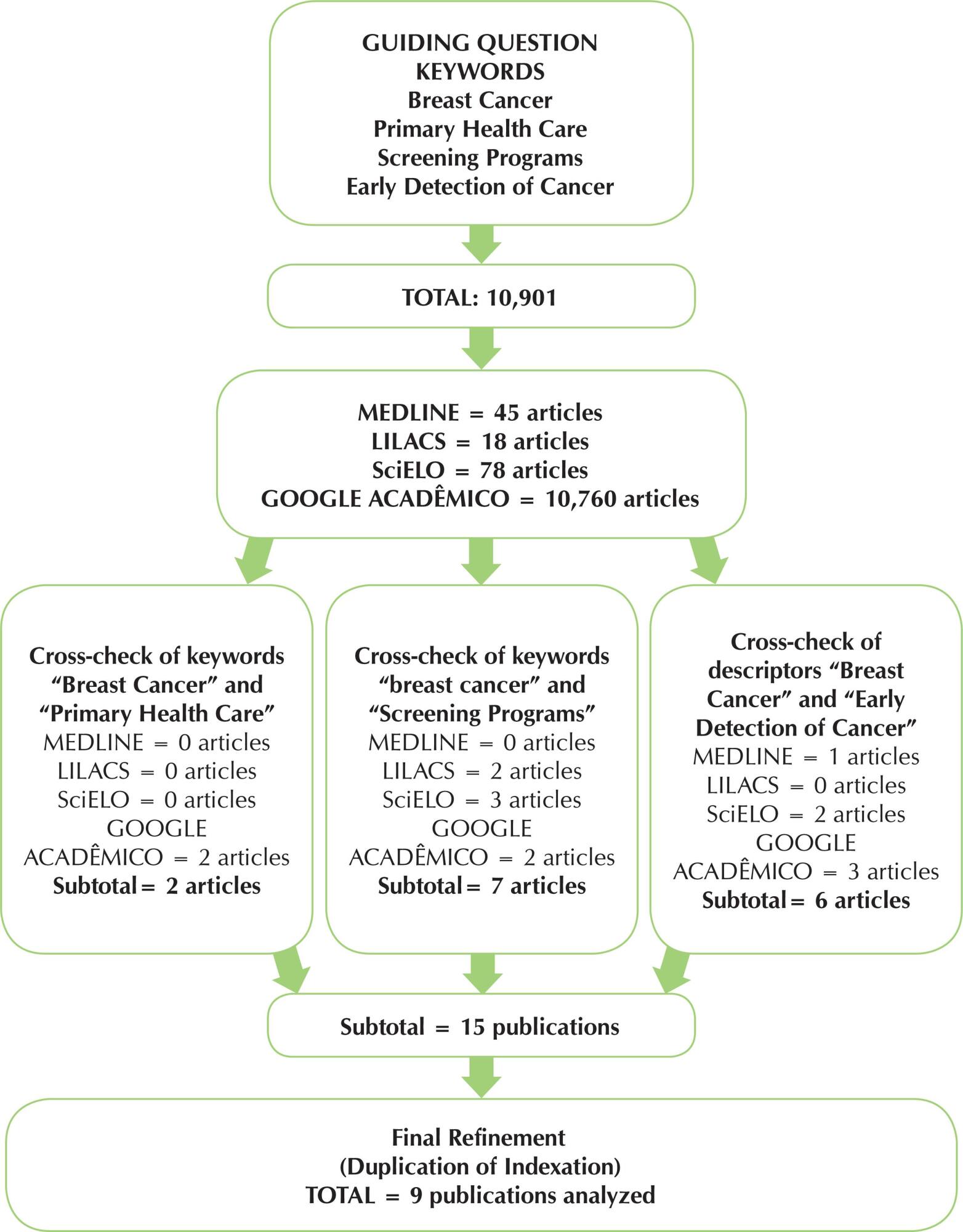
-
ORIGINAL ARTICLE06-14-2024
Validity of the TBApp mobile application for self-care management for people with tuberculosis
Revista Brasileira de Enfermagem. 2024;77(2):e20230195
Abstract
ORIGINAL ARTICLEValidity of the TBApp mobile application for self-care management for people with tuberculosis
Revista Brasileira de Enfermagem. 2024;77(2):e20230195
DOI 10.1590/0034-7167-2023-0195
Views1See moreABSTRACT
Objectives:
to describe the validity process of the TBApp mobile application for self-care management for people with tuberculosis linked to Primary Health Care.
Methods:
methodological research developed with ten expert judges, carried out virtually. The application was assessed in relation to content and technology quality in seven domains (objectivity; structure and appearance; relevance; functionality; reliability; usability; and efficiency), using an instrument with a Likert scale.
Results:
TBApp was considered valid, relevant, functional, reliable and effective by expert judges. The objectives, structure and presentation and relevance domains presented an overall Content Validity Index of 0.93, and the functionality, reliability, usability and efficiency domains presented characteristics and sub-characteristics values greater than 0.80.
Conclusions:
TBApp is a creative and innovative tool that can be used by people with TB and disseminated in the scientific community.
-
Evolution of nursing teaching in the use of education technology: a scoping review
Revista Brasileira de Enfermagem. 2021;74:e20200422
Abstract
Evolution of nursing teaching in the use of education technology: a scoping review
Revista Brasileira de Enfermagem. 2021;74:e20200422
DOI 10.1590/0034-7167-2020-0422
Views1See moreABSTRACT
Objective:
To identify and map the technological tools of information and communication to support the teaching learning process in Nursing teaching courses.
Methods:
This is a scoping review whose search was carried out in seven databases and in grey literature. After an initial analysis of the selection, 88 texts were read integrally, and 29 made up the final sample.
Results:
Virtual learning environment and object, simulation, hypermedia, and software or cellphone applications were the tools the nursing professors used the most. Studies highlight that the application of technology was important in the teaching-learning process, since it encouraged teaching based on safe care, motivating and developing abilities/competences, supported on significant, effective, flexible, and autonomous learning.
Conclusion:
The contribution of the technology for nursing formation stands out, but it should be highlighted that its employment must be critical, reflective, based on pedagogical theories and developed by trained professors.

-
ORIGINAL ARTICLE10-01-2022
Self-care of elderly people with diabetes mellitus and the nurse-patient interpersonal relationship
Revista Brasileira de Enfermagem. 2022;75(1):e20201257
Abstract
ORIGINAL ARTICLESelf-care of elderly people with diabetes mellitus and the nurse-patient interpersonal relationship
Revista Brasileira de Enfermagem. 2022;75(1):e20201257
DOI 10.1590/0034-7167-2020-1257
Views1INTRODUCTIONChronic non-communicable diseases are the main causes of death and health problems in the world, causing about 41 million deaths each year, which corresponds to approximately 71% of all deaths. Among these diseases, diabetes mellitus has stood out due to the increase in its incidence and prevalence().Estimates indicate that 463 million people live with diabetes […]See more -
ORIGINAL ARTICLE09-24-2022
Nurses’ performance in palliative care: spiritual care in the light of Theory of Human Caring
Revista Brasileira de Enfermagem. 2022;75(1):e20210029
Abstract
ORIGINAL ARTICLENurses’ performance in palliative care: spiritual care in the light of Theory of Human Caring
Revista Brasileira de Enfermagem. 2022;75(1):e20210029
DOI 10.1590/0034-7167-2021-0029
Views1See moreABSTRACT
Objectives:
to analyze nurses’ role in assisting patients in palliative care, with emphasis on the spiritual dimension, in the light of Theory of Human Caring.
Methods:
this is an exploratory, qualitative study, carried out in a hospital in João Pessoa, Paraíba, between August and December 2019, with 10 nurses. For data collection, semi-structured interviews were used. For analysis, we opted for content analysis.
Results:
the spiritual dimension of care is contemplated by several religious and spiritual practices. These are respected and encouraged by nurses, although there is difficulty in providing care for the spiritual dimension.
Final Considerations:
nurses have attitudes consistent with Jean Watson’s Theory and apply the Caritas Process elements during assistance to patients’ spiritual dimension in palliative care.
-
ORIGINAL ARTICLE03-27-2023
Adaptation and validation of an adult patient classification instrument with emphasis on the family dimension
Revista Brasileira de Enfermagem. 2023;76(2):e20220530
Abstract
ORIGINAL ARTICLEAdaptation and validation of an adult patient classification instrument with emphasis on the family dimension
Revista Brasileira de Enfermagem. 2023;76(2):e20220530
DOI 10.1590/0034-7167-2022-0530
Views1ABSTRACT
Objectives:
to adapt and validate an instrument for classifying adult patients that emphasizes the family support network in the demand for nursing care.
Methods:
methodological study, carried out in three phases: adaptation of an instrument considering the reality of adult patients; content validation with seven experts and assessment of measurement properties (construct validity and internal consistency) with 781 hospitalized patients.
Results:
in content validation, the indicators reached the values established for the Content Validity Index (0.85-1.00). In the confirmatory factor analysis, the 11 indicators were distributed in three domains and presented average variance extracted and factor loading greater than 0.5. Composite reliability was greater than 0.7.
Conclusions:
the present study adapted and made available, with evidence of validity and reliability, an instrument for classifying adult patients that considers the family support network in the demand for nursing care.
Keywords:Factor AnalysisFamilyHospital Organization and AdministrationPatient-Centered CareValidation StudiesSee more
-
ORIGINAL ARTICLE04-14-2023
Guide for Systematization of Care and Nursing Process: educational technology for professional practice
Revista Brasileira de Enfermagem. 2023;76:e20210975
Abstract
ORIGINAL ARTICLEGuide for Systematization of Care and Nursing Process: educational technology for professional practice
Revista Brasileira de Enfermagem. 2023;76:e20210975
DOI 10.1590/0034-7167-2021-0975
Views1ABSTRACT
Objective:
to elaborate and validate the content of a digital guide educational technology on Systematization of Nursing Care and Nursing Process.
Methods:
applied research of technological development, developed between 2020 and 2021, in three steps. First, a scoping review was carried out to elaborate the content. In the second step, the content was validated with 46 nurse judges selected for convenience. The minimum criterion of agreement among judges was 80%. The third step consisted of content organization and layout.
Results:
the guide content was elaborated from the Federal Nursing Council legislation, scientific articles and textbooks. Content was considered appropriate, relevant and organized by judges.
Final considerations:
the digital guide is an alternative that can contribute to the NP execution and implementation, supporting the planning and implementation of actions for quality of care.
Keywords:Educational TechnologyNursing ProcessNursing RecordsProfessional PracticeStandardized Nursing TerminologySee more
-
ERRATUM01-15-2024
ERRATUM
Revista Brasileira de Enfermagem. 2024;77(1):e2024n1e01
Abstract
ERRATUMERRATUM
Revista Brasileira de Enfermagem. 2024;77(1):e2024n1e01
DOI 10.1590/0034-7167.20247701e01
Views1In the article “The ethics of nursing care for transgender people”, with DOI number: , published in Revista Brasileira de Enfermagem, 2023;76(Suppl 3):e20220797, in authorship:Where it read:[…]See more -
REVIEW11-22-2024
Telenursing contributions in Primary Health Care in the COVID-19 pandemic context: an integrative review
Revista Brasileira de Enfermagem. 2024;77(5):e20240093
Abstract
REVIEWTelenursing contributions in Primary Health Care in the COVID-19 pandemic context: an integrative review
Revista Brasileira de Enfermagem. 2024;77(5):e20240093
DOI 10.1590/0034-7167-2024-0093
Views1See moreABSTRACT
Objective:
to identify telenursing contributions in Primary Health Care during the COVID-19 pandemic.
Methods:
an integrative literature review, conducted between January and August 2022 in the PubMed, CINAHL, LILACS, BDENF, Scopus, WoS, EMBASE and SciELO databases. A total of 493 studies was found, 62 were read in full, and of these, 16 were selected. For analysis, a dynamic reading of the studies and synthesis of the main results were carried out.
Results:
the main results highlighted telenursing practice as a challenge for professionals and the population. Among the contributions and positive points and aspects that require improvement, practice showed promise when considered in a post-pandemic scenario.
Final considerations:
through telenursing, the population’s access to Primary Health Care was guaranteed in the face of the COVID-19 pandemic. However, a critical look at current technological advances in healthcare is necessary.

-
ORIGINAL ARTICLE12-07-2020
Sarcopenia screening in elderly in primary health care: nurse knowledge and practices
Revista Brasileira de Enfermagem. 2020;73:e20200421
Abstract
ORIGINAL ARTICLESarcopenia screening in elderly in primary health care: nurse knowledge and practices
Revista Brasileira de Enfermagem. 2020;73:e20200421
DOI 10.1590/0034-7167-2020-0421
Views0See moreABSTRACT
Objective:
Describe the knowledge and practices of the Primary Health Care nurse on sarcopenia screening in the elderly.
Methods:
Qualitative study conducted with 24 Primary Health Care nurses. The data was collected through semi-structured interviews, recorded and later transcribed. The speeches were grouped in thematic categories, later analyzed, supported by Paulo Freire’s reference.
Results:
The findings showed that the primary care nurses’ knowledge of sarcopenia screening in the elderly was incipient and fragile. This reality is reflected in a gap in practice, although some instruments already require the registration of characteristics indicative of sarcopenia, such as the evaluation of the calf circumference.
Final Considerations:
The need to train nurses to perform sarcopenia screening and to implement a promotional and preventive care plan, which will result in improving the quality of life of the elderly assisted in Primary Care, was highlighted.
-
ORIGINAL ARTICLE03-30-2020
Stomized children care practices: narratives of relatives
Revista Brasileira de Enfermagem. 2020;73(2):e20180370
Abstract
ORIGINAL ARTICLEStomized children care practices: narratives of relatives
Revista Brasileira de Enfermagem. 2020;73(2):e20180370
DOI 10.1590/0034-7167-2018-0370
Views0See moreABSTRACT
Objectives:
to understand the practices adopted by relatives regarding ostomized children care.
Methods:
qualitative approach, conducted with 11 relatives of ostomized children. Methodological framework was used as narrative technique; NVivo® software for data categorization and information analysis; content analysis technique.
Results:
participants revealed unpreparedness in dealing with children, lack of knowledge about handling materials and equipment inherent to ostomy and challenges faced in the daily life of children in school. They are unanimous in telling they feel encouraged and strengthened by receiving support from nurses in child care. They suggested the development of strategies to guide ostomized children care, such as educational material use.
Conclusions:
to understand family members’ experience made it possible to support training and qualification of nursing professionals, and to establish priorities in care. Evidence found may contribute to reflections that aid health promotion and prevention of complications in ostomized children care.
-
ORIGINAL ARTICLE03-30-2020
Parental care for infants with feeding tube: psychosocial repercussions
Revista Brasileira de Enfermagem. 2020;73(2):e20180360
Abstract
ORIGINAL ARTICLEParental care for infants with feeding tube: psychosocial repercussions
Revista Brasileira de Enfermagem. 2020;73(2):e20180360
DOI 10.1590/0034-7167-2018-0360
Views0See moreABSTRACT
Objectives:
to understand the psychosocial repercussions experienced by caregiving parents, resulting from care for the child with dysphagic cleft lip and palate.
Methods:
qualitative study, developed in a tertiary hospital in September 2016. The sample defined by theoretical saturation consisted of seven mothers. Data collection was performed by unstructured interview, being audio-recorded and fully transcribed. Symbolic Interactionism was used as theoretical framework, and Thematic Content Analysis as methodological framework.
Results:
the following themes emerged: diagnosisimpact and coping; coping with overload and stress; interaction between caregivers as an acceptance and coping strategy; impact on family and social life of caregivers; and curiosity coping, and family and community prejudice.
Final considerations:
despite the physical and emotional overload, the mother figure plays the main and determining role in care, reflecting the complexity of care.
-
Institutional strategies to prevent violence in nursing work: an integrative review
Revista Brasileira de Enfermagem. 2019;72(4):1052-1060
Abstract
Institutional strategies to prevent violence in nursing work: an integrative review
Revista Brasileira de Enfermagem. 2019;72(4):1052-1060
DOI 10.1590/0034-7167-2018-0687
Views0See moreABSTRACT
Objective:
To analyze the production of research that adopted as object of investigation: institutional strategies, actions and programs to curb and/or prevent the nursing workplace violence.
Method:
Integrative review of 14 articles in full, available in the databases LILACS, PubMed Central, Scopus, CINAHL and Web of Science.
Results:
Of the articles analyzed, most arise from quantitative research (71%), carried out in the United States (65%), with educational actions (57%) and programs (43%), denoting policies.
Conclusion:
Results showed various ways to curb or prevent nursing workplace violence. These are specific strategies, there are few programs deployed worldwide, usually centered in the United States, Canada and Sweden. Most of them is well evaluated and can serve as a model for the development and dissemination of policies according to the needs of each location.
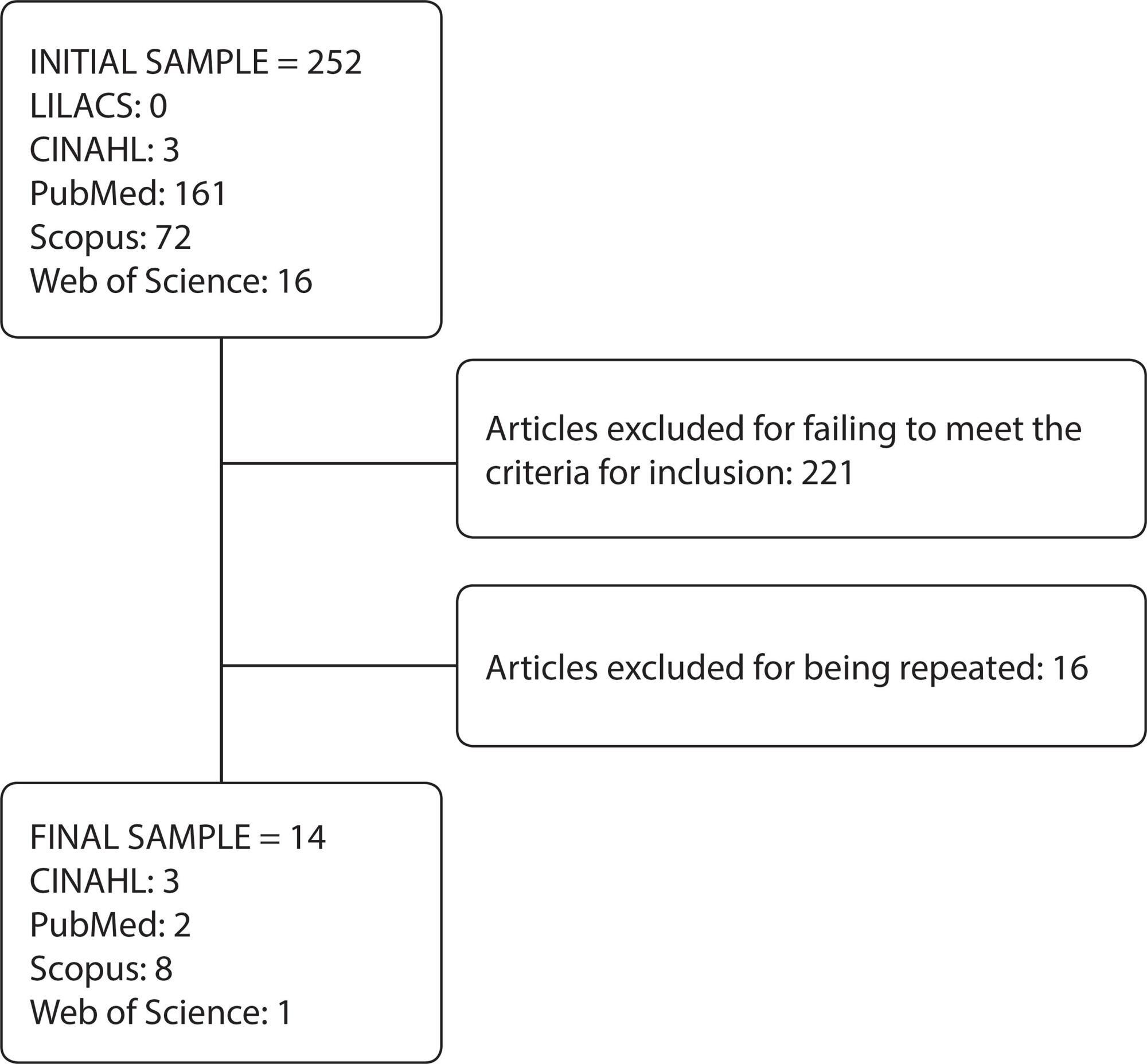
-
Professional education on dementias in Primary Health Care: an integrative review
Revista Brasileira de Enfermagem. 2019;72(4):1086-1093
Abstract
Professional education on dementias in Primary Health Care: an integrative review
Revista Brasileira de Enfermagem. 2019;72(4):1086-1093
DOI 10.1590/0034-7167-2018-0652
Views0See moreABSTRACT
Objective:
To investigate the most commonly used educational approaches in dementia training for primary health care professionals.
Method:
Integrative literature review, conducted between April and June of 2018, in PubMed, LILACS and IBECS databases. The descriptors used were: Training, Health Personnel, Dementia, Primary Health Care for PubMed; and the MeSH terms, Training Programs, Health Personnel, Dementia, and Primary Health Care for LILACS and IBECS.
Results:
The sample consisted of 13 articles; eight were published in the last five years (62%); seven articles with a quantitative approach (54%); seven articles produced on the European continent (54%), followed by five published on the North American continent (38%). All journals were from the health area (100%).
Conclusion:
Educational strategies were combined and used for education. Significant improvements in knowledge, skills, and attitudes of the teams with regard to professional management of dementias were evidenced.

-
ORIGINAL ARTICLE12-16-2023
School Nursing Guide for student health promotion: construction and validity
Revista Brasileira de Enfermagem. 2023;76(1):e20220260
Abstract
ORIGINAL ARTICLESchool Nursing Guide for student health promotion: construction and validity
Revista Brasileira de Enfermagem. 2023;76(1):e20220260
DOI 10.1590/0034-7167-2022-0260
Views0See moreABSTRACT
Objectives:
to describe the process of construction and validity of a School Nursing Guide for student health promotion.
Methods:
a methodological study, carried out from February to December 2021, composed of Convergent Care Research based on Pender’s Health Promotion Model. Based on the literature and dialogue with 11 nurses in the seven online focus groups, actions were constructed. Subsequently, 24 judges assessed content and appearance.
Results:
the guide proposes strategies for developing school nursing practices focusing on health promotion. The Appearance Validity Index ranged from 0.63 to 1.0, and the total was 0.84. The Content Validity Index ranged from 0.95 to 1.0, and the total was 0.997.
Conclusions:
the guide incorporated the needs of young people recognized by professionals, and the assessment phase confirms its validity, and can be used in the context of practice with young people.
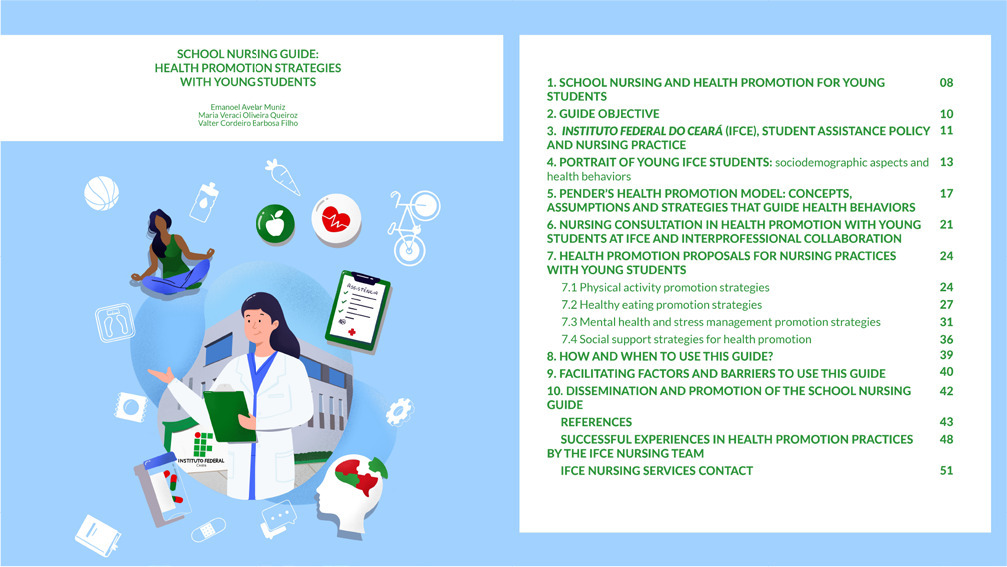
-
REVIEW07-10-2020
Acute Kidney Injury by SARS-CoV-2 virus in patients with COVID-19: an integrative review
Revista Brasileira de Enfermagem. 2020;73:e20200354
Abstract
REVIEWAcute Kidney Injury by SARS-CoV-2 virus in patients with COVID-19: an integrative review
Revista Brasileira de Enfermagem. 2020;73:e20200354
DOI 10.1590/0034-7167-2020-0354
Views0See moreABSTRACT
Objective:
to assess scientific evidence on SARS-CoV-2 Acute Kidney Injury in patients with COVID-19.
Methods:
an integrative review, with adoption of PICO strategy and classification of the level of evidence, carried out on April 10, 2020 in the PubMed database, of articles available between December 2019 and April 2020.
Results:
the sample consisted of six original, five observational and one experimental articles. Observational studies addressed the clinical findings of patients with COVID-19 and association between kidney damage, infection, and morbidity-mortality.
Conclusion:
the studies addressed the mechanism of intracellular infection of SARS-CoV-2, its cytopathic effects on kidney cells and incidence of acute kidney injury in patients infected with SARS-CoV-2. Acute kidney injury is associated with increased mortality and morbidity in these patients. This review realizes the need for new research that can mention kidney care to patients with COVID-19.
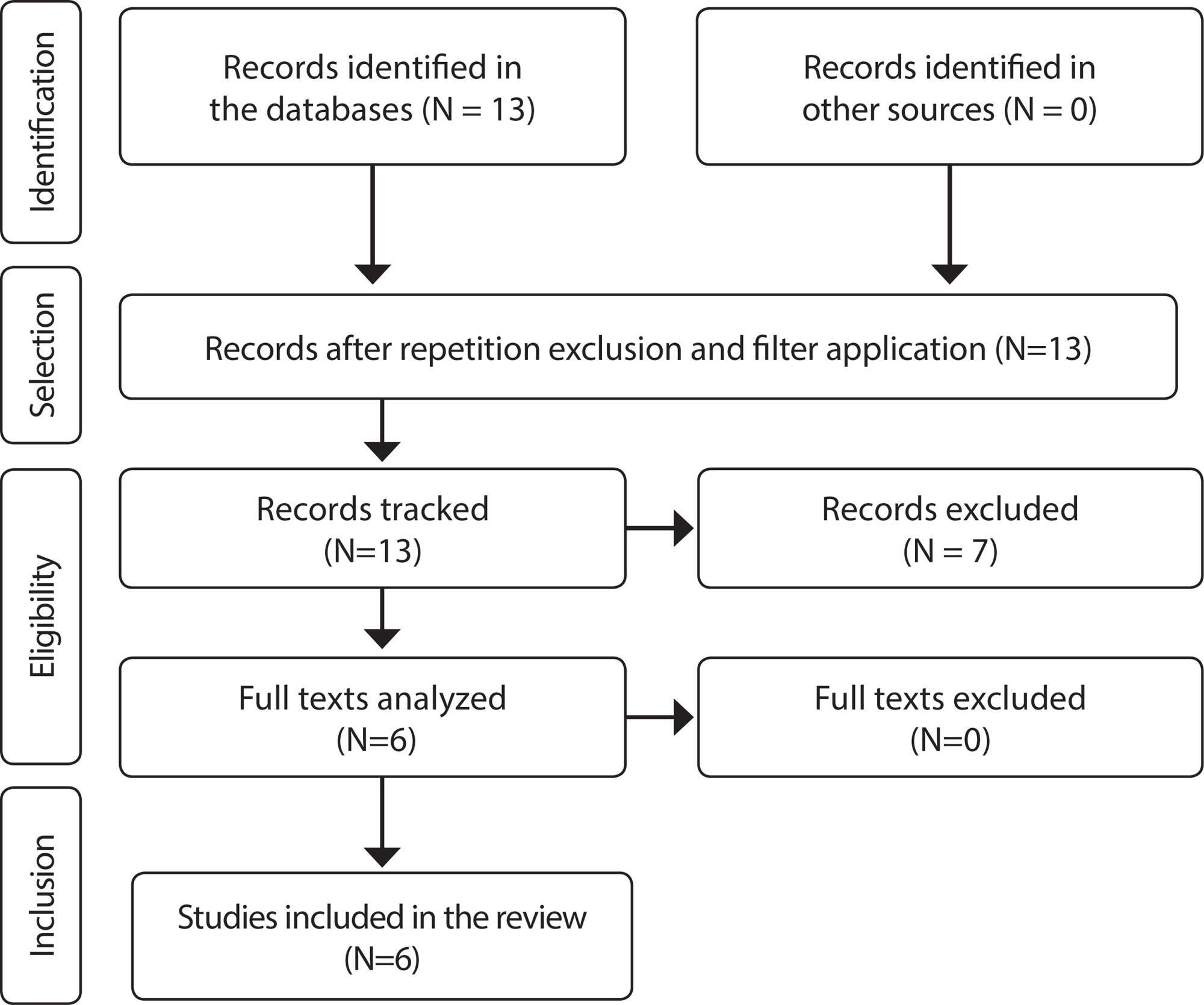
-
REVIEW07-14-2021
Complications, clinical manifestations of congenital syphilis, and aspects related to its prevention: an integrative review
Revista Brasileira de Enfermagem. 2021;74(4):e20190318
Abstract
REVIEWComplications, clinical manifestations of congenital syphilis, and aspects related to its prevention: an integrative review
Revista Brasileira de Enfermagem. 2021;74(4):e20190318
DOI 10.1590/0034-7167-2019-0318
Views0See moreABSTRACT
Objectives:
to identify the scientific evidence about the clinical complications and manifestations of congenital syphilis and aspects related to its prevention.
Methods:
integrative review after a search in the databases LILACS and MEDLINE, carried out in March 2018, using the descriptors “syphilis, congenital”, “complications”, and “signs and symptoms”, leading to the selection of 27 researches.
Results:
the publications found were published from 1966 to 2017, and most of them were from Latin America and Africa. Negative outcomes, laboratory changes, and the clinical manifestations in congenital syphilis, whether early or delayed, were, respectively: low weight at birth, anemia, hepatosplenomegaly, and dental alterations. The lack of treatment of the pregnant women in the prenatal was the most common occasion in which the opportunity to prevent the complications of congenital syphilis was lost.
Conclusions:
the scientific evidences analyzed showed serious complications of congenital syphilis that could be avoided if early opportunities of diagnosing and treating the pregnant women are not lost during the prenatal.
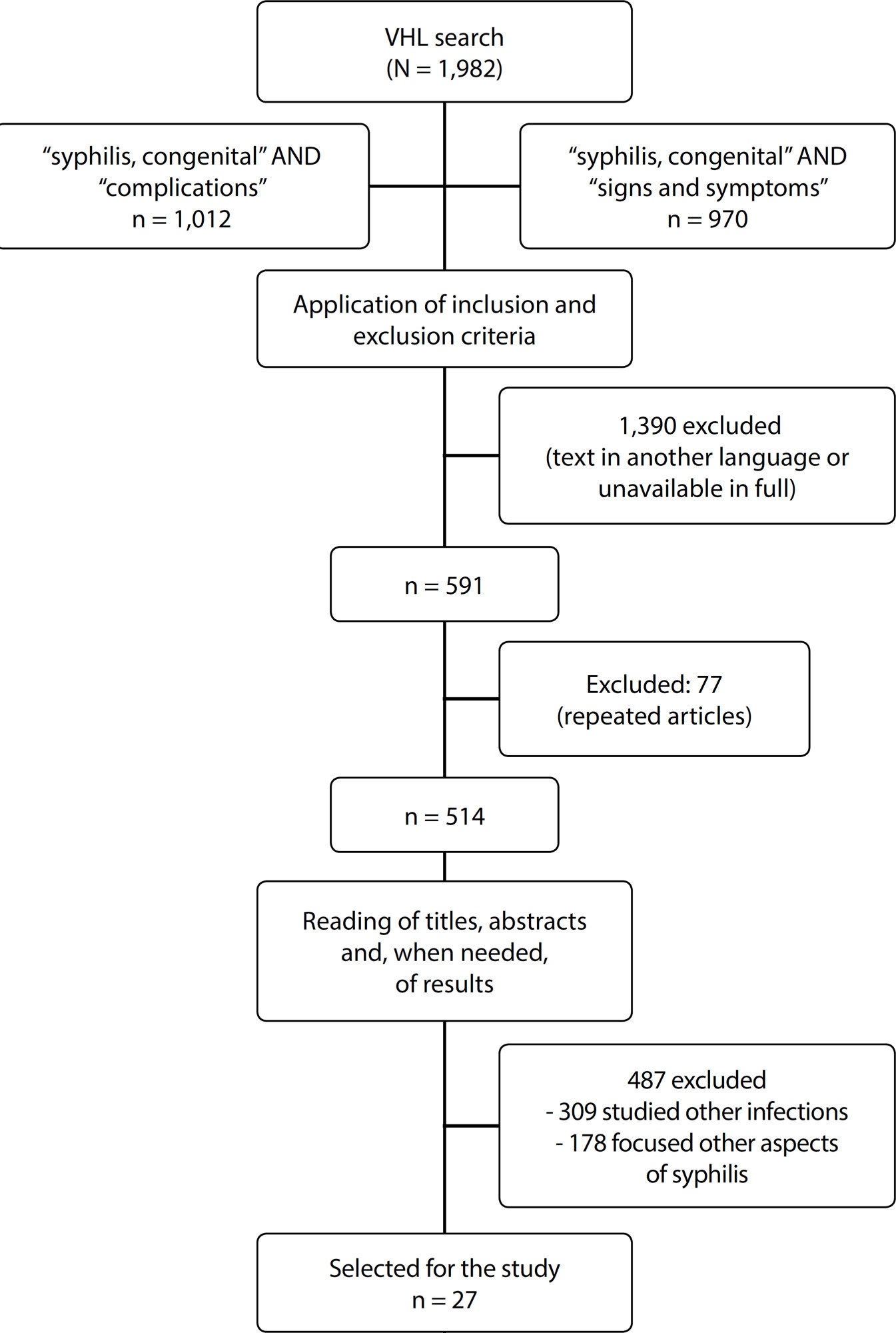
Search
Search in:
Nuvem de Tags
Aged (144) Atenção Primária à Saúde (239) COVID-19 (104) Cuidados de Enfermagem (269) Educação em Enfermagem (151) Educação em Saúde (139) Enfermagem (930) Estudos de Validação (131) Health Education (144) Idoso (208) Mental Health (149) Nursing (987) Nursing Care (306) Patient Safety (151) Primary Health Care (284) Qualidade de Vida (104) Quality of Life (106) Saúde Mental (145) Segurança do Paciente (150) Validation Studies (108)



